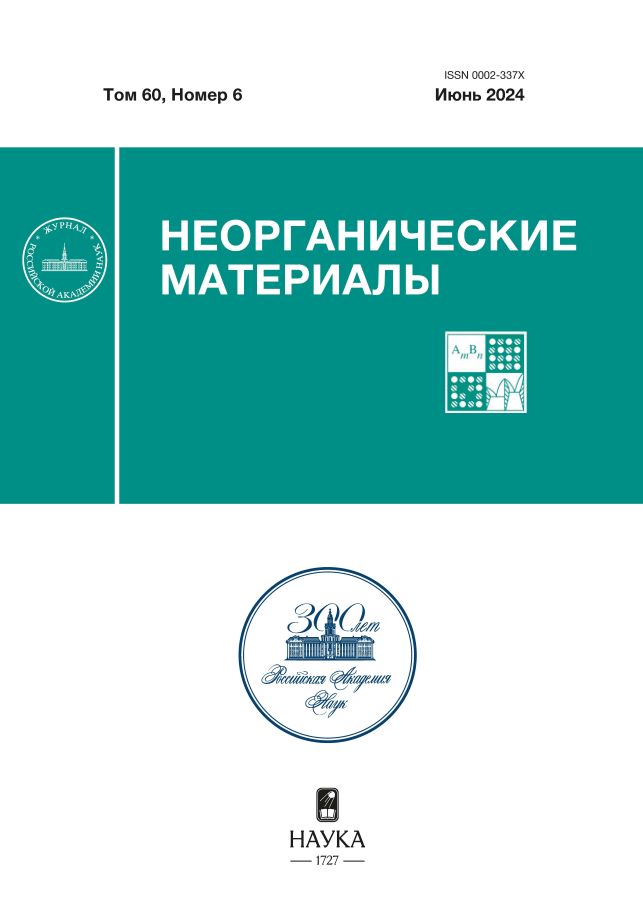Исследование влияния концентрации носителей заряда и дефектов структуры на спектры комбинационного рассеяния в монокристаллах GaAs, полученных методом Чохральского
- Autores: Максимов А.Д.1, Тарасов Ю.И.1, Санжаровский Н.А.1, Чусовская К.А.1
-
Afiliações:
- МИРЭА – Российский технологический университет
- Edição: Volume 60, Nº 6 (2024)
- Páginas: 661-666
- Seção: Articles
- URL: https://rjonco.com/0002-337X/article/view/681558
- DOI: https://doi.org/10.31857/S0002337X24060018
- EDN: https://elibrary.ru/MSWYXD
- ID: 681558
Citar
Texto integral
Resumo
Исследованы спектры комбинационного рассеяния света, полученные на кристаллическом арсениде галлия, выращенном методом Чохральского. Обнаружено, что частота связанной колебательной плазмон-фононной моды с ростом концентрации электронов n возрастает и приближается к частоте моды поперечных колебаний при n~3 × 1018 см−3. Установлено, что рост концентрации дырок приводит к уширению пика продольных колебаний. При увеличении степени разупорядоченности наблюдалось снижение относительной интенсивности поперечной моды.
Palavras-chave
Texto integral
Sobre autores
А. Максимов
МИРЭА – Российский технологический университет
Autor responsável pela correspondência
Email: maksimov_a@mirea.ru
Rússia, пр. Вернадского, 78, Москва, 119454
Ю. Тарасов
МИРЭА – Российский технологический университет
Email: maksimov_a@mirea.ru
Rússia, пр. Вернадского, 78, Москва, 119454
Н. Санжаровский
МИРЭА – Российский технологический университет
Email: maksimov_a@mirea.ru
Rússia, пр. Вернадского, 78, Москва, 119454
К. Чусовская
МИРЭА – Российский технологический университет
Email: maksimov_a@mirea.ru
Rússia, пр. Вернадского, 78, Москва, 119454
Bibliografia
- Nguyen P. T., Dinh N. T., Ho K. H. Effects of Electric Field and Device Size on the Electron Velocity in p-i-n GaAs Semiconductor // Phys. Lett. A. 2023. V. 490. P. 129174. https://doi.org/10.1016/j.physleta.2023.129174
- Lackner D., Urban T., Lang R., Pellegrino C., Ohlmann J., Dudek V. Ultrafast GaAs MOVPE Growth for Power Electronics // J. Cryst. Growth. 2023. V. 613. P. 127201. https://doi.org/10.1016/j.jcrysgro.2023.127201
- Smith E., Dent G. Modern Raman Spectroscopy: A Practical Approach. 2nd Ed. N.Y.:Wiley, 2019.
- Desnica U.V., Wagner J., Haynes T.E., Holland O.W. Raman and Ion Channeling Analysis of Damage in Ion‐Implanted GaAs: Dependence on Ion Dose and Dose Rate // J. Appl. Phys. 1992. V. 71. № 6. P. 2591–2595. https://doi.org/10.1063/1.351077
- De Biasio M. et al. Raman Spectroscopy for Thermal Characterization of Semiconductor Devices // Next-Generation Spectroscopic Technologies XV. 2023. V. 12516. P. 212–218. https://doi.org/10.1117/12.2682223
- Burns G., Dacol F.H., Wie C.R., Bursteint E., Cardona M. Phonon Shifts in Ion Bombarded GaAs: Raman Measurements // Solid State Commun. 1987. V. 62. № 7. P. 449–454. https://doi.org/10.1016/0038-1098(87)91096-9
- Brodsky M. H. Raman Scattering in Amorphous Semiconductors // Light Scattering in Solids I. Topics in Applied Physics/Ed. Cardona M. V. 8. Berlin, Heidelberg: Springer, 1983.
- Olson C. G., Lynch D. W. Longitudinal-Optical-Phonon-Plasmon Coupling in GaAs // Phys. Rev. 1969. V. 177. № 3. P. 1231. https://doi.org/10.1103/PhysRev.177.1231
- Yu P., Cardona M. Fundamentals of Semiconductors Physics and Materials Properties. Berlin, Heidelberg: Springer, 2010.
- Böer K.W., Pohl U.W. Properties and Growth of Semiconductors // Semiconductor Physics. Cham: Springer, 2014.
- Adachi S. GaAs, AlAs, and : Material Parameters for Use in Research and Device Applications // J. Appl. Phys. 1985. V. 58. № 3. P. 1–29. https://doi.org/10.1063/1.336070
- Dobal P. S., Bist H. D., Mehta S. K., Jain R. K. Inho-mogeneities in MBE-Grown GaAs/: A Micro-Raman Study // Semicond. Sci. Technol. 1996. V. 11. № 3. P. 315–322. https://doi.org/10.1088/0268-1242/11/3/008
- Steele J. A., Lewis R. A., Henini M., Lemine O. M., Fan D., Mazur Yu. I., Dorogan V. G., Grant P. C., Yu S.-Q., Salamo G. J. Raman Scattering Reveals Strong LO-phonon-hole-plasmon Coupling in Nominally Undoped GaAsBi: Optical Determination of Carrier Concentration // Opt. Express. 2014. V. 22. P. 11680–11689. https://doi.org/10.1364/OE.22.011680
- Takeuchi H., Sumioka T., Nakayama M. Longitudinal Optical Phonon-Plasmon Coupled Mode in Undoped GaAs/n-Type GaAs Epitaxial Structures Observed by Raman Scattering and Terahertz Time-Domain Spectroscopic Measurements: Difference in Observed Modes and Initial Polarization Effects // IEEE Trans. Terahertz Sci. Technol. 2017. V. 7. № 2. P. 124–130. https://doi.org/10.1109/TTHZ.2017.2650220
- Duan J., Wang C., Vines L., Rebohle L., Helm M., Zeng Y., Zhou S., Prucna S. Increased Dephasing Length in Heavily Doped GaAs // New J. Phys. 2021. V. 23. P. 083034. https://doi.org/10.1088/1367-2630/ac1a98
Arquivos suplementares















